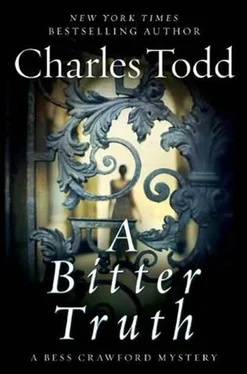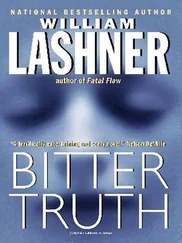With a sigh I rose from the window to look in on Lydia. But before I could open my door there was a light tap, and then Lydia stepped in.
“Roger is looking decidedly sheepish. What did you say to him?”
I thought about our conversations, about the occupant of Bluebell Cottage, and Roger Ellis’s suspicious nature. Hardly something I could pass on to Lydia.
Instead I said, “I’d written a brief note to my mother, and when your husband saw it in my hand, he thought I was carrying a message from you to the occupant of Bluebell Cottage. By the time he realized his mistake, I could see that he was more than a little jealous. Have you given him cause to be?”
She threw up her hands in disgust. “That’s Gran’s doing. I volunteered to read to Davis Merrit. In fact, it was Mr. Harris, the rector, who asked if I had the time to come and read to him. And I’ll be honest, I enjoyed it. He’s an interesting man-Lieutenant Merrit-and the books he chooses interest me as well. Gran disapproves, and it was she who put the idea into Roger’s head that there might be more to those weekly afternoons than meets the eye. No, I’m not in love with Davis. Nor he with me. I suppose we’re both lonely, and there’s comfort in companionship. Such as it is.”
But sometimes loneliness led to something more. And pity could change to compassion, and compassion to love. Still, if it was true that Gran had made more of a kindness than was justified by the facts, it would have been wise for Lydia to see less of Merrit for the time being.
I said as much, and she replied, “Yes, I expect you’re right. But it seemed unnecessarily cruel to Davis to punish him just because such things were very different in Gran’s day. After all, we don’t meet in the cottage, we sit in the Rectory or sometimes he arranges for a parlor at The King’s Head. It’s all very proper.”
“I’ve seen him, Lydia. He’s rather attractive. And you’re vulnerable, with Roger away for so many years.”
She glared at me. “If I were intending to have an affair,” she said, the ring of truth in her voice, “I’d look for someone in London. Far away from Ashdown Forest. Davis is the frying pan to Roger’s fire.”
“You knew what the heath was like, didn’t you? When you married Roger?”
“I thought I did. Roger had brought me here before we were married, and of course I was in love and this was his home. I hadn’t seen it in the depths of winter.” She smiled at a memory. “On my first visit, I found a nest of mice under a gorse bush. Tiny things, hardly as big as my thumb. I watched them for a quarter of an hour. It seemed magical. I’d never found mice in Bury St. Edmunds.”
I laughed. “No, I expect not. Shall we go? Mrs. Ellis must be waiting for me to help with the bed in the blue room. I promised we’d see to it as soon as I returned from Hartfield.”
“Yes, and I’ve left the silver teapot half polished.” She sighed. “Alan wouldn’t have cared for all this fuss, but I know how much it means to his mother. And it’s given her something to keep her mind occupied.” She shivered. “You’d have liked Alan, Bess. He could make you laugh at nothing, and he had the loveliest baritone voice. It was a pleasure to listen to him sing.” As we walked toward the stairs, she added, “Before he went to join his ship in 1914, he put all his affairs in order. I wondered if he had a premonition that he might not be coming back.”
The first of the guests were expected in time for tea. It was a little later than that when I heard a motorcar on the drive. By the time I’d looked out, I couldn’t see who had arrived. I smiled to myself, thinking that it was too soon for the Colonel Sahib to appear in full dress uniform and a battalion of Household Cavalry at his back. Or at the very least prepared to deploy the full force of his charm. It could be formidable.
A few moments later, Daisy, flushed with excitement, hurried into the library where I was folding the ironed table linens on the wide desk there to tell me that someone had called to see me.
“To see me?” I repeated. The Colonel Sahib after all.
But it was Simon standing in the hall.
“I should have known. Wild horses couldn’t have kept you away. I’m sorry that you’ve made the journey for nothing. I spoke to my mother this morning. I won’t be coming home until Sunday.”
“I was sent for from Sandhurst,” he said, and I knew not to ask why. “I stopped at Mrs. Hennessey’s when I got back to London, and read your message. Knowing you, I asked her to pack several dresses for you to wear for dinner. According to her, you’d brought only one with you.”
“Did Mother tell you I was staying over?”
He laughed. “She didn’t need to tell me. I had a feeling you’d succumb to pleading. All right, where shall I take your fripperies?”
“You only came to be sure this wasn’t a den of iniquity,” I retorted. But I was inordinately glad to see him.
We carried the valise up the stairs to my room, and as he walked into it he said, “Much more cheerful than the hall.”
“Yes, I thought so as well.” We deposited the valise by the wardrobe.
He glanced at the open door, then crossed the room to close it.
“Are you all right, Bess? You know nothing about these people, after all.”
“Apparently Lydia’s father-in-law had met the Colonel Sahib out in India. That practically makes me one of the family.”
He smiled but wasn’t put off by my humor.
“You can’t manage all this”-his hand swept over the two valises, the one I’d taken with me and the one he’d brought-“on a train. I’ll come for you. Or the Colonel will. Is there a telephone here in the house?”
“No. I put in the call from The King’s Head in Hartfield. Mrs. Ellis has offered to send me home with her son. Or failing that, a family friend, George something, will take me to London.”
I could tell he wasn’t happy about that, but he said nothing. I explained about the concussion, and he nodded. With a final look around the room, he opened the door, and I led him back to the hall. Lydia was there, and Roger.
Simon greeted her like an old friend, although I could tell he was silently taking note of the progression of the bruise on her face. Roger flushed a little as Simon turned to him. Lydia made the introductions and said, “We dined with Mr. Brandon while I was in London.”
It had been a lunch, but I said nothing.
“Indeed,” Roger Ellis replied as the two men shook hands.
“I’ll be off, then,” Simon said. “I’ll tell your mother, shall I, that everything was to your liking?”
We hadn’t opened the valises. He meant the situation. “Yes, please. And give her my love. I’ll see her at the end of the weekend.”
He put a comradely hand on my shoulder, a warning I thought to Roger Ellis not to lay a hand on me if he were in the mood to attack women. Then he bade us farewell and was gone out the door. As I heard the motorcar turn in the drive and head for the track through the forest, I felt alone somehow.
“How long have you known Brandon?” Captain Ellis was asking.
“Simon? All of my life, I expect. I can’t recall a time when he wasn’t there. He was in my father’s regiment.”
“A military man, is he?” I knew what he was asking: Why wasn’t Simon in uniform? He was young enough to fight.
“Retired,” I said simply. “He serves now at the discretion of the War Office.” Turning to Lydia, I said, “I think we’ve done everything on Mrs. Ellis’s list. Should we go up now and change?”
“Yes, that’s a very good idea. It was nice of Mr. Brandon to bring what you needed. But I would have gladly let you borrow something.”
Mrs. Ellis came in at that moment and said, “There you are, Roger, my dear. Would you mind running over to the Lanyon farm and asking them to deliver more wood, if they have it? Just to be sure we don’t run short. And that reminds me, I need another dozen eggs. I expect I ought to take the other motorcar and beg Janet Smyth for whatever she has to spare.” She turned to me. “Bess, would you and Lydia mind coming back down here and keeping an eye open for George? He should have been here three-quarters of an hour ago.”
Читать дальше












